 When one insurance company subrogates against another insurance company and both are members of intercompany arbitration, arbitration is mandatory. It is the type of damages sought that determines whether arbitration is compulsory, not the type of coverage afforded by the Respondent. The type of liability coverage afforded by the Respondent is irrelevant. For example, when a vehicle sustains damage at a car wash and both the liability carrier for the car wash and the personal auto insurer for the damaged vehicle are members of arbitration, they must arbitrate the subrogation claim. A Respondent could be an auto liability insurer, a homeowner’s liability, a general liability carrier, or a products liability carrier. If the carrier is signatory to auto arbitration, arbitration is still mandatory.
When one insurance company subrogates against another insurance company and both are members of intercompany arbitration, arbitration is mandatory. It is the type of damages sought that determines whether arbitration is compulsory, not the type of coverage afforded by the Respondent. The type of liability coverage afforded by the Respondent is irrelevant. For example, when a vehicle sustains damage at a car wash and both the liability carrier for the car wash and the personal auto insurer for the damaged vehicle are members of arbitration, they must arbitrate the subrogation claim. A Respondent could be an auto liability insurer, a homeowner’s liability, a general liability carrier, or a products liability carrier. If the carrier is signatory to auto arbitration, arbitration is still mandatory.
What about auto arbitration when one of the carriers involved is not a member of arbitration? As conventional wisdom would have it—arbitration would not even be available in such instances; yet alone mandatory. But as Nicolas Copernicus learned a scant 500 years ago, conventional wisdom is not always accurate. As it turns out, there are plenty of situations where two parties must arbitrate auto claims even though they are not members of or signatories to arbitration. Subrogation professionals should be familiar with when and where auto arbitration is mandatory.
District of Columbia
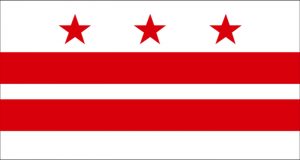 Med Pay and PIP claims can get complicated in Washington, D.C., Maryland, and Virginia. The laws themselves are not complicated; instead, it is complex because each jurisdiction’s laws differ, and many accidents involve more than one jurisdiction (e.g., a D.C. accident involving a Virginia resident). One of the factors plaintiff’s lawyers take into consideration in deciding whether to file a PIP claim for one of their clients is whether the insurer has subrogation rights (and/or the right to be reimbursed) for PIP benefits. In multi-jurisdictional metropolitan areas like this, PIP or Med Pay coverage is generally governed by the law of the place where the insurance contract was issued (“lex loci contractus”). For example, Maryland PIP coverage for a Virginia resident is usually governed by Virginia law, even if the collision occurs in Maryland.
Med Pay and PIP claims can get complicated in Washington, D.C., Maryland, and Virginia. The laws themselves are not complicated; instead, it is complex because each jurisdiction’s laws differ, and many accidents involve more than one jurisdiction (e.g., a D.C. accident involving a Virginia resident). One of the factors plaintiff’s lawyers take into consideration in deciding whether to file a PIP claim for one of their clients is whether the insurer has subrogation rights (and/or the right to be reimbursed) for PIP benefits. In multi-jurisdictional metropolitan areas like this, PIP or Med Pay coverage is generally governed by the law of the place where the insurance contract was issued (“lex loci contractus”). For example, Maryland PIP coverage for a Virginia resident is usually governed by Virginia law, even if the collision occurs in Maryland.
Auto Collision/Property Subrogation. When an insured vehicle is damaged due to the negligence of a third person, an auto insurer is considered subrogated to the rights of the insured and is allowed to proceed against the responsible tortfeasor to recover the property damage claim payments made by the insurer.[1] The moment the insurer pays the insured the amount of his loss to the damaged auto, it becomes subrogated to the insured’s rights against the tortfeasor, and an actual assignment is not necessary.[2] However, physical damage subrogation claims must be arbitrated before the Board of Consumer Claims Arbitration for the District of Columbia, established by § 50‑503.[3] This arbitration is binding but limited solely to the issues of liability and damages. Every auto insurer doing business in District of Columbia must be a member of the National Intercompany Arbitration Agreement sponsored by the Committee on Insurance Arbitration.[4]
Personal Injury Protection (PIP) Subrogation. PIP benefits may be subrogated in the District of Columbia, but to be able to subrogate, one vehicle must be other than a “passenger motor vehicle.”[5] A “passenger motor vehicle” means any vehicle other than one registered as a commercial vehicle or for livery, rental, sightseeing, or taxi purposes.[6] However, subrogation and reimbursement must be accomplished through mandatory intercompany arbitration between the two insurers.
Delaware
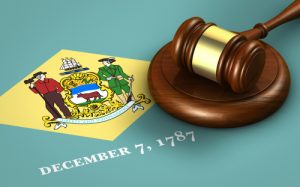 All insurers authorized to write auto insurance in Delaware are deemed signatory companies of the insurance industry forums arbitration agreements for accidents, insured events, or losses occurring within the limits of the State of Delaware.[7] This is true for both first-party and third-party claims and to first-party claims in other states or territories of the United States or foreign countries.[8] All insurers writing coverage required under § 2118 are required to submit all subrogation claims among insurers or self-insurers to mandatory arbitration, rather than filing in Delaware state court.[9] An arbitration award for PIP subrogation is final and non-appealable. This creates something of a conundrum, because, as described below, it is possible under some circumstances for Arbitration Forums to deny jurisdiction under its own rules in certain circumstances. Arbitration Forums will not hear matters involving accidents which occur out-of-state, or which involved self-insured entities.[10]
All insurers authorized to write auto insurance in Delaware are deemed signatory companies of the insurance industry forums arbitration agreements for accidents, insured events, or losses occurring within the limits of the State of Delaware.[7] This is true for both first-party and third-party claims and to first-party claims in other states or territories of the United States or foreign countries.[8] All insurers writing coverage required under § 2118 are required to submit all subrogation claims among insurers or self-insurers to mandatory arbitration, rather than filing in Delaware state court.[9] An arbitration award for PIP subrogation is final and non-appealable. This creates something of a conundrum, because, as described below, it is possible under some circumstances for Arbitration Forums to deny jurisdiction under its own rules in certain circumstances. Arbitration Forums will not hear matters involving accidents which occur out-of-state, or which involved self-insured entities.[10]
Section 2118(j)(9) requires insurers and self-insurers to arbitrate “any claims for losses or damages within the coverages required under § 2118(2)(a).”[11] Subsections (1) through (4) of Subsection (j) specify that arbitration must be administered by the Insurance Commissioner and that the Commissioner select a panel of three arbitrators, one of whom must be an attorney.[12] Arbitration Forums does not have jurisdiction over a subrogation claim where the underlying accident occurred in a state other than the one where relief is being sought.[13] Because Arbitration Forums doesn’t accept jurisdiction of out-of-state losses and § 2118 has cut off access to the courts, at least one court has indicated that under such circumstances, insurance companies seeking to exercise PIP subrogation have no recourse.[14] The courts have indicated that the subrogation rights of insurers under these circumstances are “stuck in a procedural quagmire.”[15] Some subrogation practitioners still believe that an out-of-state insurer seeking to exercise PIP subrogation rights in Delaware, may do so based on common law (equitable) subrogation.
When the dispute is between two insurers, it is arbitrated by the Wilmington Auto Accident Reparation Arbitration Committee or its successors. When a self-insured entity is involved, the dispute is resolved in the manner set forth for disputes involving insured persons – arbitration before the Commissioner. This is a mandatory arbitration scheme for disputes between insurers and disputes between an insurer and a self-insured entity. However, the process is merely optional for insured persons pursuant to § 2118(j)(5), the “Optional Arbitration Statute.” A self-insurer is treated as an insurer and not as an insured person, under this system.
In summary, Auto, PIP, Property, and Special forums are mandatory in Delaware. As explained on the Arbitration Forums website:
21 Del. C. 2118(g)(3) references “amounts paid pursuant to paragraphs (a)(1)-(4) of this section….”
Paragraph (a)(1): “Indemnity from legal liability for bodily injury, death or property damage arising out of ownership, maintenance or use of the vehicle to the limit, exclusive of interest and costs, of at least the limits prescribed by the Financial Responsibility Law of this State.” Disputes arising from these claims are resolved through the Special Arbitration forum.
Paragraph (a)(2): “Compensation to injured persons for reasonable and necessary expenses incurred within 2 years from the date of the accident…” Disputes arising from these claims are resolved through the PIP forum.
Paragraph(a)(3): “Compensation for damage to property arising as a result of an accident involving the motor vehicle, other than damage to a motor vehicle, aircraft, watercraft, self-propelled mobile equipment and any property in or upon any of the aforementioned.” Disputes arising from these claims are resolved through the Property forum.
Paragraph (a)(4): “Compensation for damage to the insured motor vehicle.” Disputes arising from these claims are resolved through the Auto forum.[16]
For questions specific to the intercompany arbitration process itself, please contact Arbitration Forums at status@arbfile.org or 1-866-977-3434.
Maryland
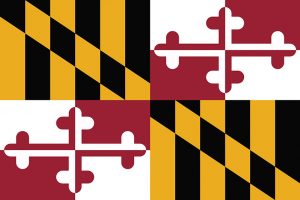 Binding arbitration is mandatory for all collision subrogation in this state. Under Maryland law, any carrier that issues, sells or delivers motor vehicle liability or physical damage insurance policies in Maryland are required to arbitrate all motor automobile vehicle physical damage claims in accordance with an auto subrogation program sponsored by an arbitration organization chosen by the insurer requesting the arbitration.[17] Section 19-514 requires that carriers which issue, sell, or deliver motor vehicle liability or physical damage insurance policies in Maryland must arbitrate and settle all motor vehicle physical damage claims between the authorized insurers in accordance with an auto subrogation program sponsored by the intercompany arbitration organization chosen by the authorized insurer that requests arbitration. This means that if both the subrogated carrier and third-party liability carrier are signatories to arbitration, and the basis of the claim is property damage only, then the two carriers must submit the matter to binding arbitration.
Binding arbitration is mandatory for all collision subrogation in this state. Under Maryland law, any carrier that issues, sells or delivers motor vehicle liability or physical damage insurance policies in Maryland are required to arbitrate all motor automobile vehicle physical damage claims in accordance with an auto subrogation program sponsored by an arbitration organization chosen by the insurer requesting the arbitration.[17] Section 19-514 requires that carriers which issue, sell, or deliver motor vehicle liability or physical damage insurance policies in Maryland must arbitrate and settle all motor vehicle physical damage claims between the authorized insurers in accordance with an auto subrogation program sponsored by the intercompany arbitration organization chosen by the authorized insurer that requests arbitration. This means that if both the subrogated carrier and third-party liability carrier are signatories to arbitration, and the basis of the claim is property damage only, then the two carriers must submit the matter to binding arbitration.
Minnesota
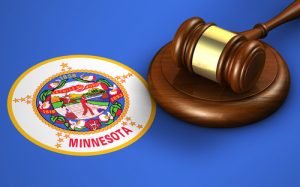 No-Fault PIP Benefits Claim. In 1985, Minnesota started requiring binding arbitration of most no-fault disputes.[18] Prior to this, PIP was optional and was used infrequently. The statute makes arbitration mandatory both for first-party no-fault PIP claims and for property damage claims under first party collision and comprehensive insurance coverages. Mandatory arbitration applies only to claims which are $10,000 or less “at the commencement of arbitration.”[19] Arbitration is mandatory only if the amount of all pending claims at the time of the filing of the arbitration is less than $10,000, even if a portion of the pending claim has not been formally denied until after the arbitration is commenced.[20] This includes cases in which the insurer has paid some benefits and less than $10,000 in coverage is remaining.[21]
No-Fault PIP Benefits Claim. In 1985, Minnesota started requiring binding arbitration of most no-fault disputes.[18] Prior to this, PIP was optional and was used infrequently. The statute makes arbitration mandatory both for first-party no-fault PIP claims and for property damage claims under first party collision and comprehensive insurance coverages. Mandatory arbitration applies only to claims which are $10,000 or less “at the commencement of arbitration.”[19] Arbitration is mandatory only if the amount of all pending claims at the time of the filing of the arbitration is less than $10,000, even if a portion of the pending claim has not been formally denied until after the arbitration is commenced.[20] This includes cases in which the insurer has paid some benefits and less than $10,000 in coverage is remaining.[21]
PIP Indemnity. A Minnesota statute provides that a PIP carrier can pursue reimbursement (indemnity) of PIP benefits from the “reparation obligor” (i.e., insurance carrier) of a commercial vehicle. It provides indemnity for the PIP carrier where a commercial vehicle (in excess of 5,500 pounds curb weight) is at least 50% at fault for the accident.[22] This § 65B.53, subd. 1 claim must be brought directly against the reparation obligor (insurer) of the commercial vehicle in mandatory intercompany arbitration and is governed by intercompany arbitration rules. The purpose of this statute is to allocate the risk and accompanying costs associated with the use of commercial vehicles. The indemnity provision merely shifts the expense of operating commercial vehicles from the private passenger no-fault insurer to the insurer of the commercial vehicle. Arbitration of no-fault disputes is administered through the American Arbitration Association (AAA).
Collision Subrogation. Auto property damage subrogation is allowed in Minnesota.[23] However, collision subrogation claims of $10,000 or less at the time of arbitration are subject to mandatory arbitration.[24] Minnesota’s No-Fault Laws do not limit the subrogation rights of a reparation obligor providing collision coverage to a policyholder.[25] However, collision subrogation claims of $10,000 or less at the time of arbitration are subject to mandatory arbitration.[26]
New York
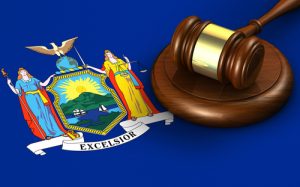 PIP Subrogation / Loss Transfer Arbitration. When two “covered” persons are involved in an accident, either the PIP carrier or a workers’ compensation carrier paying benefits in lieu of PIP basic benefits may pursue reimbursement against the negligent tortfeasor only if any of the vehicles “involved” in the collision (even if it is not the insured vehicle or at-fault vehicle) (1) weighs over 6,500 lbs.[27] or (2) is a livery (vehicle for hire) vehicle.[28] Loss Transfer subrogation must be pursued through mandatory arbitration.[29] The Superintendent of Insurance is granted the authority to set the rules for this arbitration and has established Arbitration Forums as the exclusive arbitrator for such matters.[30] The Motor Vehicle Accident Indemnification Corporation (MVAIC) has similar recovery rights pursuant to the § 5105 Loss Transfer Statute also.[31]
PIP Subrogation / Loss Transfer Arbitration. When two “covered” persons are involved in an accident, either the PIP carrier or a workers’ compensation carrier paying benefits in lieu of PIP basic benefits may pursue reimbursement against the negligent tortfeasor only if any of the vehicles “involved” in the collision (even if it is not the insured vehicle or at-fault vehicle) (1) weighs over 6,500 lbs.[27] or (2) is a livery (vehicle for hire) vehicle.[28] Loss Transfer subrogation must be pursued through mandatory arbitration.[29] The Superintendent of Insurance is granted the authority to set the rules for this arbitration and has established Arbitration Forums as the exclusive arbitrator for such matters.[30] The Motor Vehicle Accident Indemnification Corporation (MVAIC) has similar recovery rights pursuant to the § 5105 Loss Transfer Statute also.[31]
When a PIP carrier seeks recovery of PIP payments from the insurer of a covered person (tortfeasor) through Loss Transfer arbitration, the statute of limitations is three (3) years from each PIP payment made.[32] Specific arbitration procedures regarding mandatory arbitration between insurers pursuant to § 5105 can be found in New York’s insurance regulations.[33]
The parties must attempt to negotiate a settlement before resorting to the arbitration process for either Loss Transfer or Priority of Payment claims. As a condition precedent to filing loss transfer arbitration, a party requesting reimbursement of first-party benefits from another party, as provided in §§ 5105 or 5221(b) of the Insurance Law, shall make such request as soon as reasonably practicable on the prescribed “Inter-Company Reimbursement Notification Form” (IRNF).[34]
Priority of Payment Arbitration. Mandatory arbitration also applies to priority of payment disputes. Priority of Payment or joint coverage disputes which occur when insurers, self-insurers, and/or compensation providers cannot resolve who is primary and responsible for no-fault benefits based on policy language, contract, or law (coverage is the issue, not liability based on negligence).[35]
Virginia
Auto property damage may be subrogated in Virginia.[36] Such subrogation claims must be arbitrated.[37] Every auto liability or physical damage carrier must be a member of the Nationwide Intercompany Arbitration Agreement (or its successor) sponsored by the Committee on Insurance Arbitration. All collision subrogation claims between carriers must be arbitrated through this forum.
For information or assistance subrogation automobile insurance claims of any type in any state or country, please contact Lee Wickert at leewickert@mwl-law.com.
[1] Trinity Universal Ins. Co. v. Moore, 134 A.2d 333 (D.C. App. 1957).
[2] Id.
[3] D.C. Code Ann. § 31-2405.
[4] Id.
[5] D.C. Code Ann. § 31-2411.
[6] D.C. Code Ann. § 31-2402(22).
[7] Id.
[8] Id.
[9] 21 Del. C. § 2118(g)(3).
[10] State Farm Mut. Ins. Co. v. United Parcel Service of America, Inc., supra; Arbitration Forums appears to employ certain internal rules under which an arbitrator has authority to refuse to take jurisdiction over a subrogation claim where the underlying accident occurred in a state other than the one where relief is being sought.
[11] 21 Del. C. § 2118(j).
[12] Id.
[13] Zurich Am. Ins. Co. v. St. Paul Surplus Lines, Inc., 2009 WL 4895120 (Del. Chancery Ct. 2009).
[14] Id.; 21st Century Assurance Co. v. Liberty Mut. Ins. Co., 2015 WL 1405925 (Del. Super. 2015).
[15] Id.
[16] https://home.arbfile.org/resources/frequently-asked-questions/frequently-asked-questions-mandatory-delaware-ar.
[17] Md. Code Insurance § 19-514.
[18] Minn. Stat. § 65B.525.
[19] Id.
[20] Hippe v. American Family Ins. Co., 565 N.W.2d 439 (Minn. App.1997).
[21] Jansen v. State Farm Mut. Auto. Co., 891 N.W.2d 69 (Minn. App. 2017).
[22] M.S.A. § 65B.53.
[23] M.S.A. § 65B.53(5).
[24] M.S.A. § 65B.53(1).
[25] M.S.A. § 65B.53. Minnesota’s No-Fault Laws are at §§ 65B.41 to 65B.71.
[26] M.S.A. § 65B.53(1).
[27] An insurer may not combine the weight of a motor vehicle and a trailer (or vehicle it is towing) to arrive at the 6,500 lb. threshold.
[28] N.Y. Ins. Law § 5105(a).
[29] N.Y. Ins. Law § 5105(b).
[30] N.Y. Comp. Codes R. & Regs. tit. 11, § 65.10.
[31] In the Matter of Motor Vehicle Accident Indemnification Corp. v. Aetna Casualty & Surety Co., 652 N.Y.S.2d 584 (N.Y. App. 1996); N.Y. Ins. Law §§ 5105 and 5221(b)(6).
[32] N.Y. C.P.L.R. § 214(2).
[33] 11 N.Y. Comp. Codes R. & Regs. 65-4.11.
[34] This requirement was removed from § 65-4.11(d) (Conditions Precedent to Filing Mandatory Arbitration) several years ago when Arbitration Forums met with the Loss Transfer Advisory Committee referred to in § 65-4.11(f). Also in attendance was the New York Department of Financial Services. It was decided that the procedures subsection, (d), would be removed from § 65-4.11 and the current language inserted. This was done to simplify the process to make future procedure changes; Arbitration Forums would simply update its rules. Therefore, the Arbitration Forums NY PIP rules do require that the IRNF be sent to prior to the initial arb filing. If not sent, this could be raised as an affirmative defense.
[35] N.Y. Ins. Law § 5107; N.Y. Comp. Codes R. & Regs. Tit. 11, N.Y. Comp. Codes R. & Regs. § 65-4.11(2).
[36] Bobbitt v. Shelby Mut. Ins. Co. of Shelby, Ohio, 161 S.E.2d 671 (Va. 1968).
[37] Va. St. § 38.2-2231.






